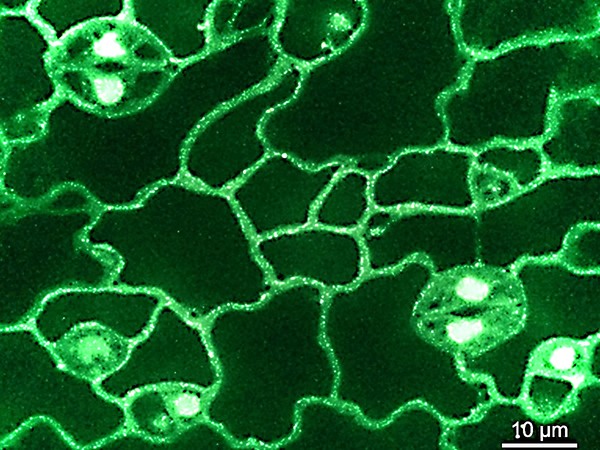Scientists from the Centre of the Region Haná for Biotechnical and Agricultural Research (CRH) entered the pages of the most prestigious journal in the plant sciences, The Annual Review of Plant Biology. Their article summarises the research into mitogen-activated protein kinases (MAPK) and described the role of these important enzymes in plants. The findings gained from the model plant Arabidopsis thaliana are now used in their research of alfalfa and barley.
“Scholars can publish in this journal only by invitation, and it happens twice, in exceptional cases three times in a lifetime. The editors are very strict in their selection, and the competition is fierce. Top authors usually summarise their own research after fifteen or twenty years, so we were very pleased to receive an invitation. We have published a very complex article; its preparation took us more than a year. It is a definite milestone in our careers and also an acknowledgement of the laboratory as a whole,” said the department’s head and the article’s main author, Jozef Šamaj, who has been investigating MAPK for roughly two decades.
MAPK are phosphorylation enzymes involved in a broad spectrum of processes in plant, animal, and human cells. Due to their regulation of cell cycles, they are also important in cancer treatment. They participate in many developmental processes in plants, from the development of seeds, embryo, pollen, and flowers, over the development of leaves and stems, to the development of roots and nodules. On the other hand, these enzymes are capable of responding very rapidly to changes in the environment and various types of stress, such as diseases, pests, drought, and other climatic influences. Olomouc researchers have been working with MAPK by means of various molecular cell biology methods on a number of levels.
“We try to localise these enzymes inside the cells, for which several models are used. The basic one is thale cress (Arabidopsis thaliana), but we also work with agricultural crops, mainly alfalfa and barley. We observe what role MAPK play in the development of plants, whether the plants are more resilient with them, how they cope with stress and survive in various life conditions,” said Prof Šamaj, concerning the research.
According to him, research in this area has significantly advanced during the monitored period, which is related to the enormous developments in microscopy. “Thanks to the advancements in microscopy, we are enabled to go even deeper into the cell, to the level of nanostructures. Another breakthrough is that we have advanced from fixed samples to living ones, and even to entire plants. In the past, we had to fix the plant first to be able to localise MAPK in the root tips, whereas today we’re able to localise the enzyme in any living cell within the whole plant in various developmental stages. It is a matter of the last five years perhaps; prior to that, it was unthinkable,” explained the plant biologist.
Scientist also can simulate stress conditions in the plants and monitor the MAPK responses inside the plant cells in controlled conditions by means of super-resolution microscopy.
“I dare say that in this respect, our institute is a pioneering one – at least within Europe – and it is one of the leading labs employing these advanced methods. We have developed some of them on our own, thus showing that our equipment may have much broader application than what they were originally designed for. Unlike other institutes that focus mainly on Arabidopsis thaliana, we have managed to transfer our findings even to crops, such as alfalfa and barley. We have cultivated several strains with suppressed as well as stimulated expression of MAPK. Then we study the phenotype, i.e. the composite of morphological and anatomical traits of those plants, and we’re even able to localise MAPK in them,” added Šamaj.
